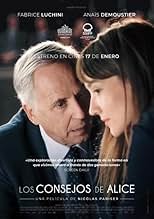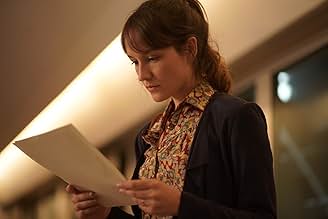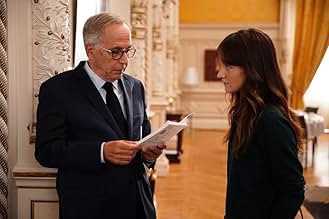IMDb RATING
6.4/10
2.8K
YOUR RATING
The mayor of Lyon is in existential crisis. After 30 years in politics, he feels totally empty and devoid of ideas. As a fix for this problem, his aides bring a brilliant young philosopher, ... Read allThe mayor of Lyon is in existential crisis. After 30 years in politics, he feels totally empty and devoid of ideas. As a fix for this problem, his aides bring a brilliant young philosopher, into his inner circle.The mayor of Lyon is in existential crisis. After 30 years in politics, he feels totally empty and devoid of ideas. As a fix for this problem, his aides bring a brilliant young philosopher, into his inner circle.
- Awards
- 2 wins & 8 nominations total
- Director
- Writer
- All cast & crew
- Production, box office & more at IMDbPro
Storyline
Did you know
- TriviaFrench visa #147111.
- GoofsWhen the motorcade leaves for the plaque inauguration, it looks like they're going north along the Rhône from the city hall, then they're going south along the Rhône (the Incity building is visible on the left) and they end up on the slopes of Croix-Rousse, which is north of city hall.
- ConnectionsReferenced in Room 999 (2023)
Featured review
Politicians and the bureaucracy around them (political parties, parliaments, governments, mayors) do not enjoy a good rating nowadays. However, films about politicians and those around them seem to be more successful than the politicians themselves. A good example in this regard is 'Alice et le maire' ('Alice and the Mayor') a film that comes from France, a country that seems to be in recent years in a permanent state of dissatisfaction with the existing economic and social order, with its political institutions and with members of the political class. The film, whose action takes place a few years ago at the City Hall of Lyon and in the milieu of the municipal and political bureaucracy of the Socialist Party, enjoyed an unexpected success without even resorting to sensationalist issues such as crime, sex, or corruption scandals. Perhaps precisely through the relaxed and slightly humorous approach, the script written by Nicolas Pariser (who is also the director of the film) reaches more effectively aspects of deeper, systemic corruption of the French political machinery.
However, the premises of the story do not seem too credible. I am not very familiar with the French political system, but I believe that even in France there are no positions for philosophers advisers to the mayors, paid on public money, nor that politicians with decades of political activity and presidential ambitions publicly declare that they are short of ideas. Probably, then, only in the films Alice (Anaïs Demoustier), a fresh graduate from Oxford, could she employed at the City Hall in Lyon just to provide ideas to Mayor Paul Theraneau (Fabrice Luchini) and that could become in a few days or weeks involved at top level in the affairs of the city and of the Socialist Party. The activity of the party on the public money of the town hall also seems little plausible. Probably the whole situation should be viewed more as a cinematic convention rather than real events in the immediate actuality. But even so, the dialogues between the mayor and the young philosopher represent the guiding thread and the most successful and probably the most important part of the movie from the point of view of the filmmakers.
The discussions between the two protagonists work very well thanks to the charm and the talent of the two actors. The mayor's role is written for Fabrice Luchini who lends to the character his noble style, intellectual charisma and impeccable French language, serving us even with a reading from a book, one of those that made him famous in France. Anaïs Demoustier copes well with the scenes that she shares with Luchini, but also with those that describe her personal dilemmas and the confrontation with the municipal bureaucracy. Secondary roles create believable portrait sketches of Alice's friends and of the politicians and bureaucrats in the town hall hierarchy. The story, however, stumbles badly towards the end, when the politician's decision or indecision at critical moments is difficult to understand, perhaps due to the use of details related to party politics. French viewers might be better off deciphering such details as well as some of the literary and cultural references appearing in discussions, but cinematically the story does not hold water. The approach of 'Alice and the Mayor' is comical and empathetic towards the heroes, the ending is open, so what we get is pleasant entertainment around a political topic. Of course, there will be other films that will address the troubled French political actuality with different approaches and from many other points of view.
However, the premises of the story do not seem too credible. I am not very familiar with the French political system, but I believe that even in France there are no positions for philosophers advisers to the mayors, paid on public money, nor that politicians with decades of political activity and presidential ambitions publicly declare that they are short of ideas. Probably, then, only in the films Alice (Anaïs Demoustier), a fresh graduate from Oxford, could she employed at the City Hall in Lyon just to provide ideas to Mayor Paul Theraneau (Fabrice Luchini) and that could become in a few days or weeks involved at top level in the affairs of the city and of the Socialist Party. The activity of the party on the public money of the town hall also seems little plausible. Probably the whole situation should be viewed more as a cinematic convention rather than real events in the immediate actuality. But even so, the dialogues between the mayor and the young philosopher represent the guiding thread and the most successful and probably the most important part of the movie from the point of view of the filmmakers.
The discussions between the two protagonists work very well thanks to the charm and the talent of the two actors. The mayor's role is written for Fabrice Luchini who lends to the character his noble style, intellectual charisma and impeccable French language, serving us even with a reading from a book, one of those that made him famous in France. Anaïs Demoustier copes well with the scenes that she shares with Luchini, but also with those that describe her personal dilemmas and the confrontation with the municipal bureaucracy. Secondary roles create believable portrait sketches of Alice's friends and of the politicians and bureaucrats in the town hall hierarchy. The story, however, stumbles badly towards the end, when the politician's decision or indecision at critical moments is difficult to understand, perhaps due to the use of details related to party politics. French viewers might be better off deciphering such details as well as some of the literary and cultural references appearing in discussions, but cinematically the story does not hold water. The approach of 'Alice and the Mayor' is comical and empathetic towards the heroes, the ending is open, so what we get is pleasant entertainment around a political topic. Of course, there will be other films that will address the troubled French political actuality with different approaches and from many other points of view.
- How long is Alice and the Mayor?Powered by Alexa
Details
- Release date
- Countries of origin
- Language
- Also known as
- Alice ve Belediye Başkanı
- Filming locations
- Lyon, Rhône, France(main location)
- Production companies
- See more company credits at IMDbPro
Box office
- Gross worldwide
- $6,163,499
- Runtime1 hour 43 minutes
- Color
- Aspect ratio
- 1.85 : 1
Contribute to this page
Suggest an edit or add missing content


![Watch Trailer [English SUB]](https://m.media-amazon.com/images/M/MV5BOTg2NTJjOWEtNDEwNy00MGJjLWE4MjQtOWQxY2U2Zjc0OGI1XkEyXkFqcGdeQXRyYW5zY29kZS13b3JrZmxvdw@@._V1_QL75_UX500_CR0)
![Bande-annonce [OV]](https://m.media-amazon.com/images/M/MV5BMTM2MDIzNjItY2YxNy00Nzc1LTkxZDctMjIyYjUyNjc1MDY0XkEyXkFqcGdeQXRyYW5zY29kZS13b3JrZmxvdw@@._V1_QL75_UX500_CR0)


























